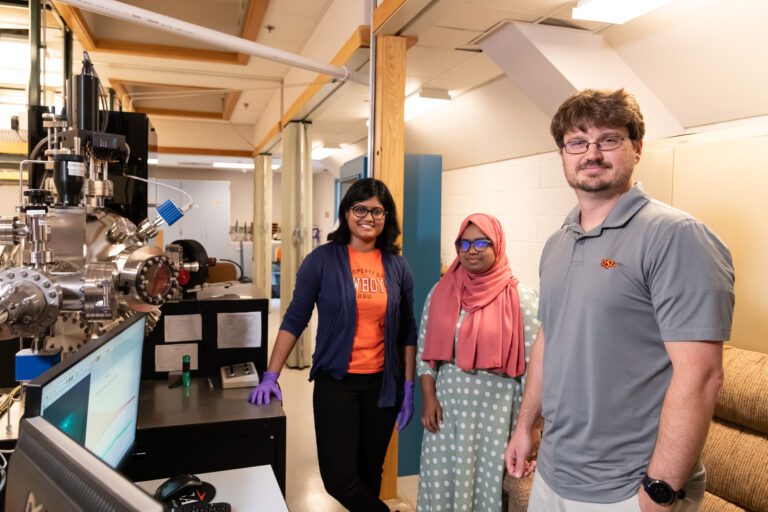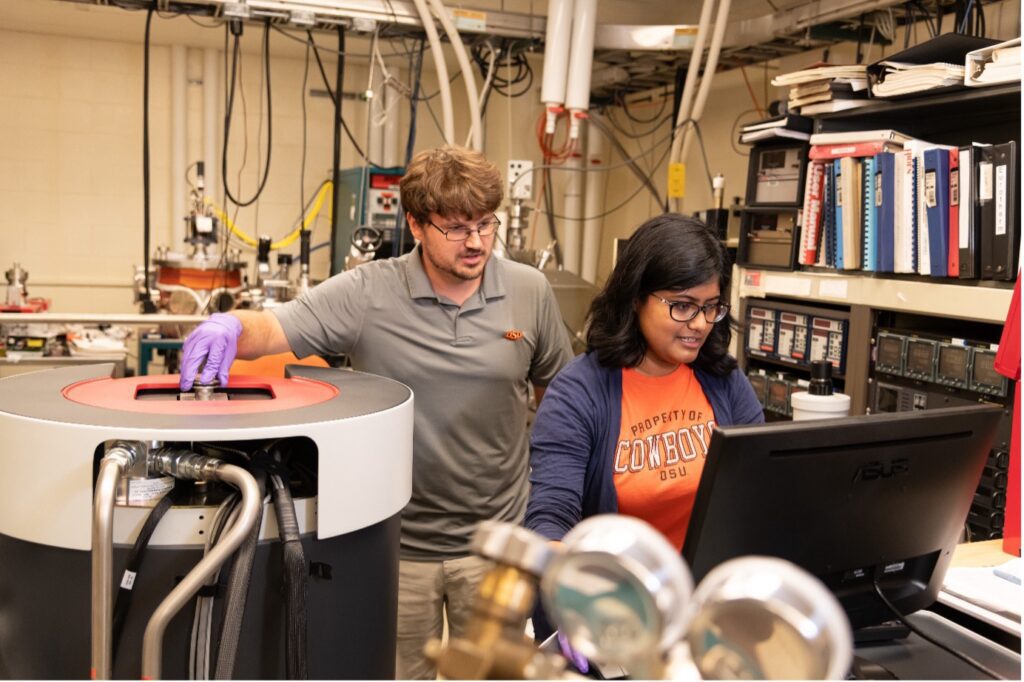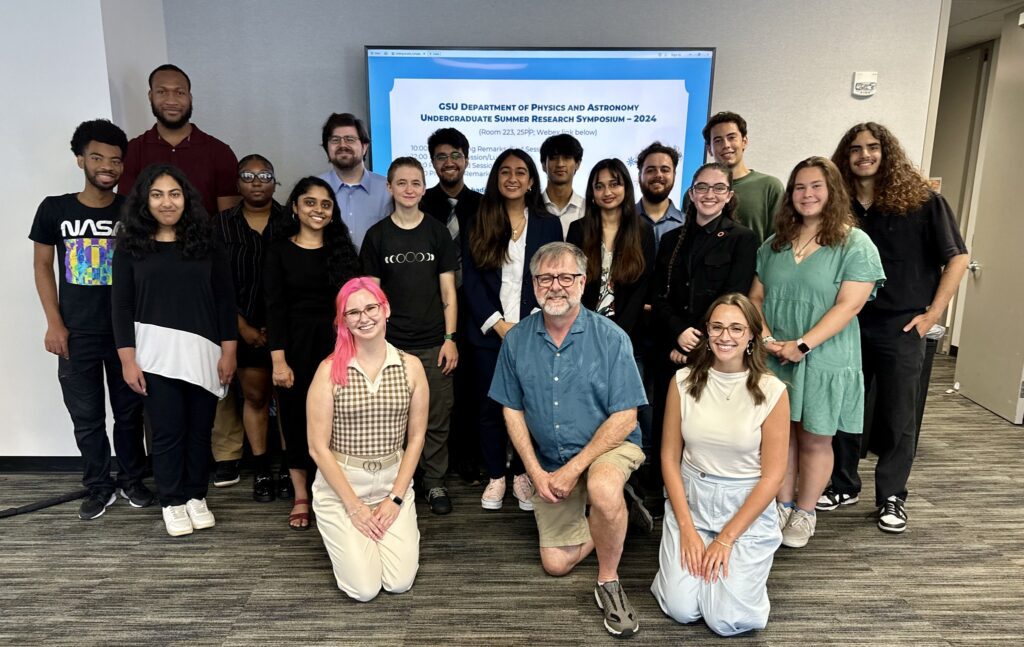
If you are looking for a science degree that deals with numbers and scientific theories, physics might be the right path for you. This is because it combines advanced mathematics, including calculus, linear algebra, and differential equations, with a strong conceptual understanding of core physics principles such as classical mechanics, electromagnetism, and thermodynamics.
Beyond mathematical proficiency, a physics degree develops your critical thinking and problem-solving skills, teaching you to analyse complex systems and come up with innovative solutions. These skills will open doors to careers across industries, such as engineering, science, technology, and finance, as leading engineers, data scientists, financial analysts, researchers, medical physicists, and many more.
Begin your journey into the world of physics in one of these three US universities.

Oklahoma State University will host 2026’s International Physicists Tournament. Source: Oklahoma State University
Oklahoma State University
When you join Oklahoma State University’s Department of Physics, ranked among the top 100 universities for physics and maths in the US, you’re set to stand at the forefront of scientific advancement. By your side are innovative and creative faculty members funded by top agencies like the National Science Foundation. Prolific as they may be, they will always be ready to support and collaborate with you.
Here, undergraduate research is embedded within your major, whether you’re aiming to earn a Bachelor of Science in Physics or Applied Physics. It’s this one-on-one experience paired with opportunities to participate in cutting-edge research — in the areas of astronomy, quantum information physics, biophysics, condensed matter physics, high-energy physics and radiation physics – that make physics at OSU stand out.
Soon, the Cowboy Family – that’s what the OSU community calls itself – will make history as the first US university to host the International Physicists Tournament (IPT). In May 2026, the department will welcome the brightest young physicists from universities around the world to Stillwater, Oklahoma.
This is the ultimate academic challenge. Teams will aim to solve 17 open physics problems in teams of six, in eight months, and competing in a challenge. Exemplary problems include: What is the largest stack of Pringles that can be built? How do you estimate the jump height of the corn kernels based on measurements of the sound of the pop in the microwave? These are problems that do not have exact solutions. Practical lab work is a must, mirroring real-world scientific challenges where creativity and experimentation are essential. On event day, there will be a Physics Fight, a series of lively discussions and debates to uncover the underlying reasons behind physical phenomena.
It’s experiences like these that nurture students into award winners. Undergraduate student Xander Rouk received the Chambliss Astronomy Achievement Student Award as “Undergraduate Honorable Mentions” at the AAS 246 meeting. The overall student population go on to win in many other ways, such as becoming sought-after candidates for technical roles in science, engineering, finance, consulting, and beyond.
If you would like to learn more about programs here or simply want to speak with someone from the department, set up a chat with a professor.

Georgia State University is one of the public institutions in the state with an R1 designation. Source: GSU Physics and Astronomy/Facebook
Georgia State University
For the last 11 years, Georgia State University has been ranked among the nation’s top five most innovative institutions. This is mostly due to its dedication to research, making it one of only a handful of public institutions in Georgia with an R1 status.
At the Physics & Astronomy department, you will work on research that ranges from the constituents of matter at the subatomic and nuclear levels to the formation and evolution of active galaxies, in state-of-the-art facilities like the CHARA Array, which is the largest optical/IR interferometer in the world. For physics students specifically, you will work on research that revolves around atomic physics, biophysics, matter physics, neurophysics, nuclear physics, and physics education.
You start doing research as soon as you enrol in the Physics, BS degree. Here, you learn to develop crucial skills, such as critical and analytical thinking, advanced problem-solving, and proficiency in mathematical and computational tools. There are a variety of concentrations to tailor to your career goals in engineering, healthcare, and technology. However, some physics graduates also find success in education, meteorology, finance, and business.
Besides in the classroom, your studies will take you outside to physics festivals, workshops, and such. An example was is from March 2023, when students opened a booth at the Atlanta Science Festival Expo called From Cosmic Rays to Food: How Does Nuclear Physics Affect My Life?, where attendees learned about space weather, cosmic rays, and the various ways in which ionising radiation is present in our everyday lives. That same year, they presented research work at the Solar Heliosphere and Interplanetary Environment (SHINE) workshop in Stowe, Vermont.

The GeoX at Colorado State University is the largest ground-source heating and cooling system in the state. Source: Colorado State University/Facebook
Colorado State University
Colorado State University is at the forefront of innovation. Its GeoX geothermal system, which is the largest ground-source heating and cooling system in the state, is proof of this. At the Department of Physics specifically, you will come up with your own problem-solving innovations according to your chosen fields. Whether it is Atomic, Molecular and Optical Physics, Condensed Matter Physics, High Energy Particle Physics, or Theory, you will learn to incorporate sustainability into your projects to power a much healthier planet.
You start by choosing a concentration within the BS in Physics – Physics or Applied Physics. The former provides a broad background in physics, while the latter offers seven fields of focus, depending on your career aspirations and goals. Both concentrations require you to complete core courses like Physics, Mathematics, Computation, and Communication, plus electives that suit your chosen concentrations.
This will result in creative, technically competent, and dynamic problem-solvers in the workforce. Evidently, graduates go on to work in major aerospace, electronics, manufacturing, and software development companies like Ball Aerospace and Technologies Corp, Colorado Energy Research Technologies, National Renewable Energy Laboratory, National Institute of Standards and Technology, and more. Others were accepted to study at top institutions like Massachusetts Institute of Technology (MIT), University of Colorado-Boulder, University of Maryland, Ohio State University, California Institute of Technology, and University of Minnesota.
*Some of the institutions featured in this article are commercial partners of Study International









